Serving 593 students in grades Prekindergarten-5, Middle Ridge Elementary School ranks in the bottom 50% of all schools in Georgia for overall test scores (math proficiency is bottom 50%, and reading proficiency is bottom 50%).
The percentage of students achieving proficiency in math is 21% (which is lower than the Georgia state average of 37%). The percentage of students achieving proficiency in reading/language arts is 27% (which is lower than the Georgia state average of 40%).
The student:teacher ratio of 13:1 is lower than the Georgia state level of 14:1.
Minority enrollment is 84% of the student body (majority Black), which is higher than the Georgia state average of 65% (majority Black).
Quick Stats (2025)
- Grades: Prekindergarten-5
- Enrollment: 593 students
- Student:Teacher Ratio: 13:1
- Minority Enrollment: 84%
- Overall Testing Rank: Bottom 50% in GA
- Math Proficiency: 21% (Btm 50%)
- Reading Proficiency: 27% (Btm 50%)
- Science Proficiency: 20-24% (Btm 50%)
- Source: National Center for Education Statistics (NCES), GA Dept. of Education
School Overview
Middle Ridge Elementary School's student population of 593 students has declined by 17% over five school years.
The teacher population of 45 teachers has declined by 6% over five school years.
Grades Offered
Grades Prekindergarten-5
Total Students
593 students
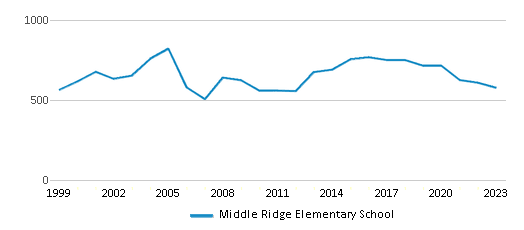
Gender %
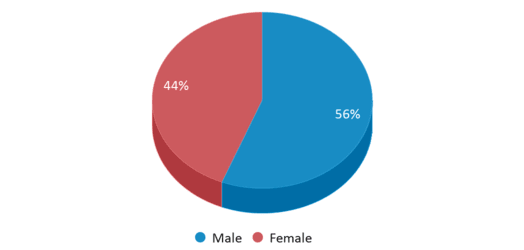
Total Classroom Teachers
45 teachers
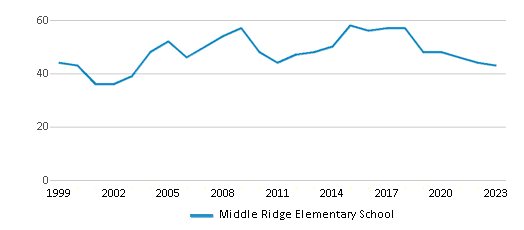
Students by Grade
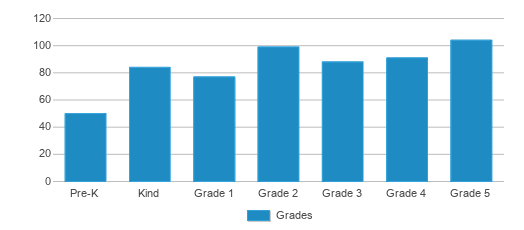
School Calendar
School Rankings
Middle Ridge Elementary School ranks within the bottom 50% of all 2,204 schools in Georgia (based off of combined math and reading proficiency testing data).
The diversity score of Middle Ridge Elementary School is 0.55, which is less than the diversity score at state average of 0.71. The school's diversity has stayed relatively flat over five school years.
Overall Testing Rank
#1570 out of 2204 schools
(Bottom 50%)
(Bottom 50%)
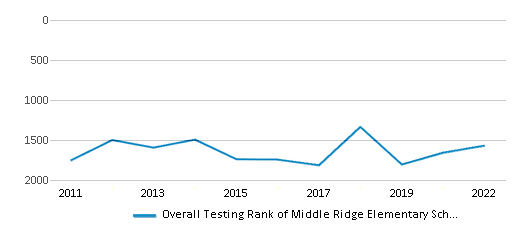
Math Test Scores (% Proficient)
21%
37%
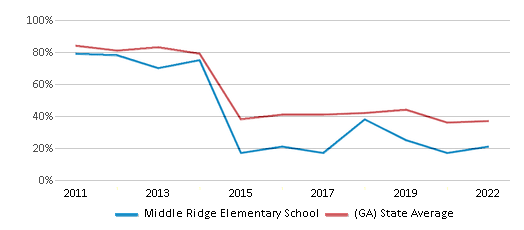
Reading/Language Arts Test Scores (% Proficient)
27%
40%
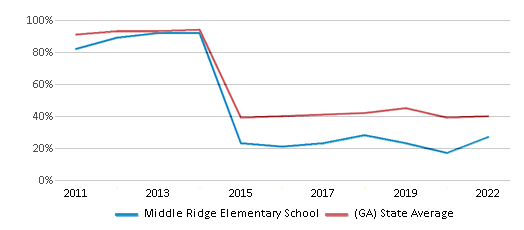
Science Test Scores (% Proficient)
20-24%
40%
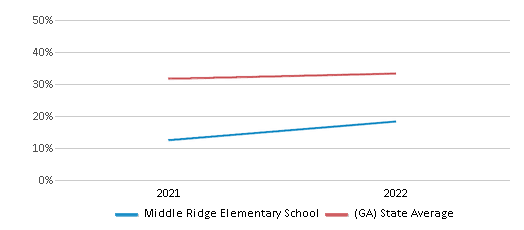
Student : Teacher Ratio
13:1
14:1
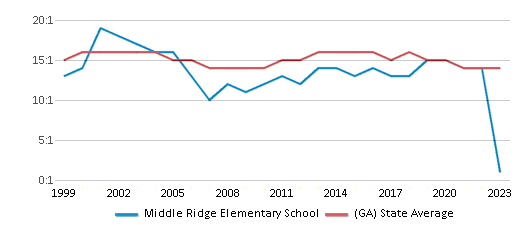
American Indian
n/a
n/a
Asian
1%
5%
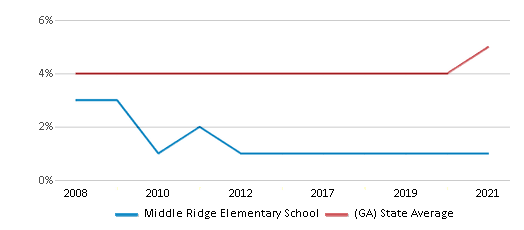
Hispanic
11%
19%
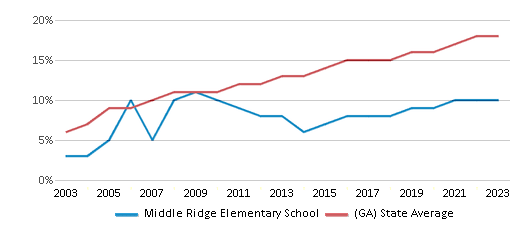
Black
64%
36%
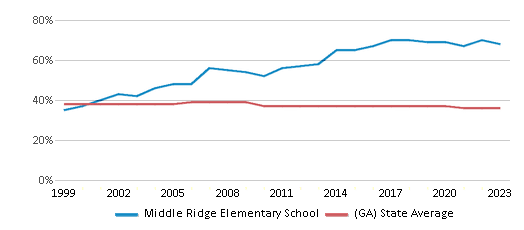
White
16%
35%
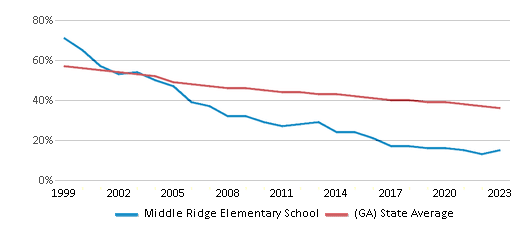
Hawaiian
1%
n/a
Two or more races
7%
5%
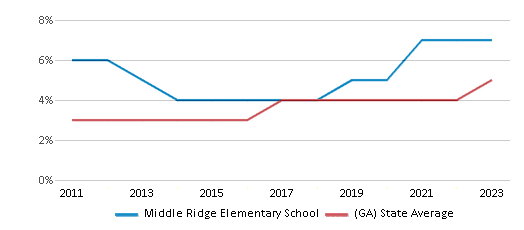
All Ethnic Groups
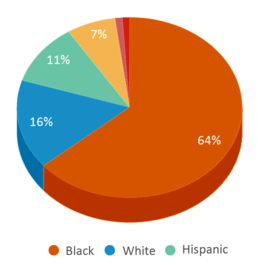
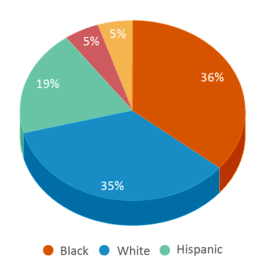
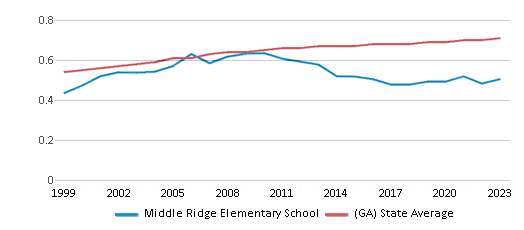
Eligible for Free Lunch
100%
59%
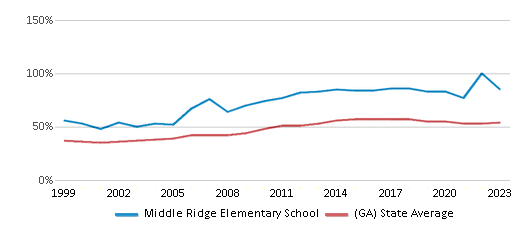
Eligible for Reduced Lunch (21-22)
7%
5%
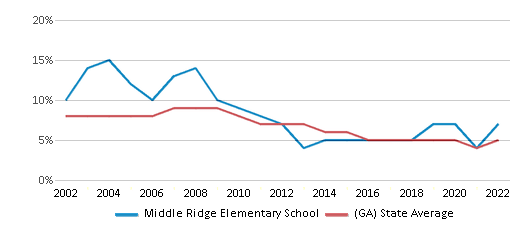
School Statewide Testing
School District Name
Source: National Center for Education Statistics (NCES), GA Dept. of Education
Profile last updated: 02/09/2025
Frequently Asked Questions
What is Middle Ridge Elementary School's ranking?
Middle Ridge Elementary School is ranked #1570 out of 2,204 schools, which ranks it among the bottom 50% of public schools in Georgia.
What schools are Middle Ridge Elementary School often compared to?
Middle Ridge Elementary Schoolis often viewed alongside schools like Walnut Grove Elementary School by visitors of our site.
What percent of students have achieved state testing proficiency in math and reading?
21% of students have achieved math proficiency (compared to the 37% GA state average), while 27% of students have achieved reading proficiency (compared to the 40% GA state average).
How many students attend Middle Ridge Elementary School?
593 students attend Middle Ridge Elementary School.
What is the racial composition of the student body?
64% of Middle Ridge Elementary School students are Black, 16% of students are White, 11% of students are Hispanic, 7% of students are Two or more races, 1% of students are Asian, and 1% of students are Hawaiian.
What is the student:teacher ratio of Middle Ridge Elementary School?
Middle Ridge Elementary School has a student ration of 13:1, which is lower than the Georgia state average of 14:1.
What grades does Middle Ridge Elementary School offer ?
Middle Ridge Elementary School offers enrollment in grades Prekindergarten-5
What school district is Middle Ridge Elementary School part of?
Middle Ridge Elementary School is part of Newton County School District.
School Reviews
5 12/13/2013
This is the hardest working school ever! Teachers and students work relentlessly! Teachers are totally committed to their students. The uniforms are an asset, studies show that strict uniform policies enhance learning and behavior! If your child goes to Middle Ridge, be thrilled about the education your child is getting!
2 9/1/2011
Recently, due to rezoning my children were change from Heard Mixon to Middle Ridge. With the disagreement from a friend of mine, who is a Newton county teacher, I allowed my children to attend and to give this school a chance. The dress code was different from their previous school and we were not told that until the first day of school. Because they have to wear what I bought, my kids are now forced to sit in ISS and learn nothing. My children are 5 and 6 and this is absurd! Is'nt school a place to be taught,learn and not to be isolated? The dress policy goes overboard, and the use of uniforms should be a parent's option. Why should our children dress all alike and not as individuals? Parents buy the clothes not the schools. These are OUR kids and WE should choose what should be worn to school. Nice neat respectable school clothes are very appropriate. I agree, the schools should have dress policies, to insure that suitable clothes are wore but uniforms should be a choice. Am I the only parent who feels this way?
Review Middle Ridge Elementary School. Reviews should be a few sentences in length. Please include any comments on:
- Quality of academic programs, teachers, and facilities
- Availability of music, art, sports and other extracurricular activities
Recent Articles

What Is A Charter School?
Explore the world of charter schools in this comprehensive guide. Learn about their history, how they operate, and the pros and cons of this educational innovation. Discover key facts about charter schools, including admission policies, demographics, and funding, as well as what to look for when considering a charter school for your child.

10 Reasons Why High School Sports Benefit Students
Discover the 10 compelling reasons why high school sports are beneficial for students. This comprehensive article explores how athletics enhance academic performance, foster personal growth, and develop crucial life skills. From improved fitness and time management to leadership development and community representation, learn why participating in high school sports can be a game-changer for students' overall success and well-being.

February 05, 2025
Understanding the U.S. Department of Education: Structure, Impact, and EvolutionWe explore how the Department of Education shapes American education, from its cabinet-level leadership to its impact on millions of students, written for general audiences seeking clarity on this vital institution.







